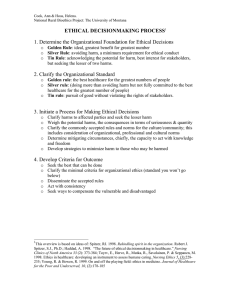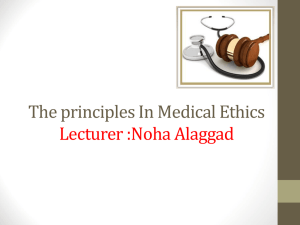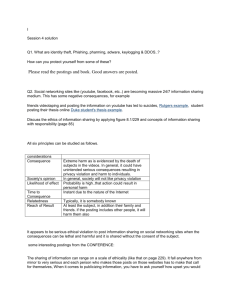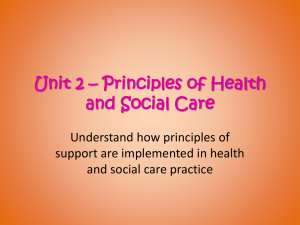Health & Social Care Principles: Ethics & Support
advertisement
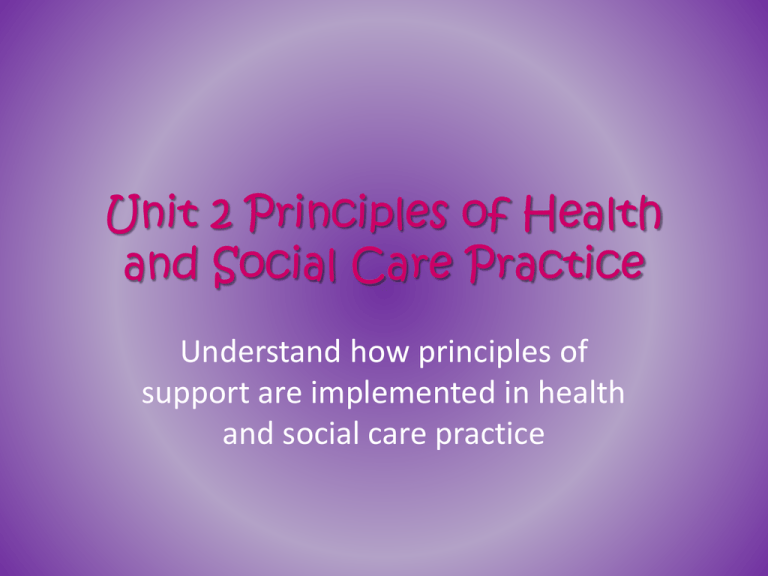
Unit 2 Principles of Health and Social Care Practice Understand how principles of support are implemented in health and social care practice Lesson Objectives • Outline the unit content • Asses the principles of support in relation to social care • Analyse ethical considerations in relation to a specific case Unit Content This unit develops understanding of the values and principles that underpin the practice of all those who work in health and social care. Learners will consider theories and policies that underpin health and social care practice and explore formal and informal mechanisms required to promote good practice by individuals in the workforce, including strategies that can influence the performance of others. Discussion What do you consider to be the important principles of health and social care practice? Working in pairs 20 mins Complete the hand out using the text book provided. Sylvio - Antonia Izzy - Marie Arefa - Hannah Catherine – Lydia You are completing the first side only Principles of health and social care • • • • • • • • • • Respecting individuality Rights Choice Privacy Independence Dignity Respect and partnership Equal opportunities Respecting diversity, different cultures and values Providing care, support and attention for individuals, family, friends, carers, groups and communities Most Important • Working individually select which principle is most important to you. • You will have 1 minute to persuade to the rest of the class why this is the most important. • 3 minutes to prepare What are ethics • At its simplest, ethics is a system of moral principles. They affect how people make decisions and lead their lives. • Ethics is concerned with what is good for individuals and society and is also described as moral philosophy. • The term is derived from the Greek word ethos which can mean custom, habit, character or disposition. • Ethics covers the following dilemmas: – – – – how to live a good life our rights and responsibilities the language of right and wrong moral decisions - what is good and bad? • Our concepts of ethics have been derived from religions, philosophies and cultures. They infuse debates on topics like abortion, human rights and professional conduct. Ref: http://www.bbc.co.uk/ethics/introduction/intro_1.shtml Ethical Principles There are four key ethical principals that every Health & Social Care worker should take into account: 1. Respect for autonomy: respecting the decision-making capacities of autonomous persons; enabling individuals to make reasoned informed choices. 2. Beneficence: this considers the balancing of benefits of treatment against the risks and costs; the healthcare professional should act in a way that benefits the patient 3. Non maleficence: avoiding the causation of harm; the healthcare professional should not harm the patient. All treatment involves some harm, even if minimal, but the harm should not be disproportionate to the benefits of treatment. 1. Justice: distributing benefits, risks and costs fairly; the notion that patients in similar positions should be treated in a similar manner. 2. Fidelity: This principle requires loyalty, fairness, truthfulness, advocacy, and dedication to our patients. It involves an agreement to keep our promises. Fidelity refers to the concept of keeping a commitment and is based upon the virtue of caring. 3. Paternalism: Healthcare professionals make decisions about diagnosis, therapy, and prognosis for the patient. Based upon the health care professional’s belief about what is in the best interest of the patient, he/she chooses to reveal or withhold patient information in these three important arenas. This principle is heavily laden as an application of power over the patient. Organ Trade Is it ethical? Lesson Objectives • Outline the unit content • Asses the principles of support in relation to social care • Analyse ethical considerations in relation to a specific case

